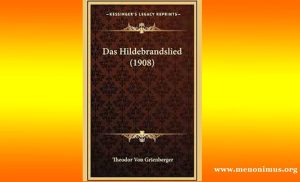Hildebrandslied-A Review
Hildebrandslied-A Review
Hildebrandslied-A Review
The “Hildebrandslied,” a remarkable piece of early Germanic literature, stands as one of the most significant texts in the corpus of Old High German poetry. Composed around the 9th century, this lyrical fragment provides a fascinating glimpse into the cultural, linguistic, and historical context of its time. In this comprehensive review, we will delve into the various aspects that make the “Hildebrandslied” a pivotal work in the study of Germanic literature.
Historical and Cultural Significance:
The “Hildebrandslied” is a fragment of a larger narrative that seems to recount a conflict between a father, Hildebrand, and his son, Hadubrand, who find themselves on opposing sides of a battle. This poem holds great historical value, as it offers insights into the tumultuous period of migrations and conflicts that characterized early medieval Europe. It provides a window into the oral tradition of storytelling and the heroic ethos that shaped the worldview of the Germanic tribes.
Linguistic Characteristics:
Written in Old High German, the “Hildebrandslied” is a vital linguistic artifact that offers valuable insights into the evolution of the German language. Its language and vocabulary provide glimpses into the linguistic structures and expressions of the time. The poem’s phonetic and grammatical features are vital resources for linguists and historians studying the development of the Germanic languages.
Structure and Style:
The “Hildebrandslied” is composed in a strophic form, with alternating long and short lines. The poem follows a rhyming scheme, which aids in its rhythmic and musical quality when recited or sung. Its lyrical nature is typical of traditional oral poetry, where rhythm and repetition play a significant role in aiding memorization and recitation.
Themes and Motifs:
The poem explores themes of conflict, loyalty, and the complexities of family relationships. The central conflict between Hildebrand and Hadubrand highlights the tragedy of a father and son unknowingly being on opposing sides of a battle. This theme of tragic separation and the tension between individual loyalty and external circumstances are timeless and continue to resonate with readers today.
Survival and Preservation:
The survival of the “Hildebrandslied” is a story in itself. It was preserved in a single manuscript, the Kassel Manuscript, which dates back to the early 9th century. Its survival through the ages is a testament to the efforts of scribes and scholars who recognized its value and significance. The fragmentary nature of the text adds an air of mystery and intrigue, leaving much to the imagination and interpretation of scholars.
Scholarly Interpretations:
The brevity of the “Hildebrandslied” has led to a range of interpretations and speculations among scholars. Questions about the missing context, the characters’ motivations, and the historical backdrop continue to stimulate discussions and debates. The poem’s enigmatic ending, in particular, has prompted numerous theories, leaving room for creative and diverse analyses.
Conclusion:
The “Hildebrandslied” stands as a unique and invaluable piece of early Germanic literature that offers a window into the past, capturing the linguistic, historical, and cultural dynamics of its time. Its fragmentary nature adds an air of mystique, prompting ongoing scholarly exploration and creative interpretations. As a bridge between the oral tradition of storytelling and the written record, the poem continues to inspire a deep appreciation for the rich literary heritage of the Germanic peoples. 0 0 0.
You May Like: Beowulf-A Review
N.B. The article originally belongs to the book entitled ‘The Reviews of Epic Literature Around the World Vol-II‘ by Menonim Menonimus.








